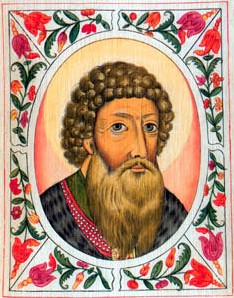(1328 – 1340)

Ivan Danilovich, the nickname of Kalita, i.e. a bag of money, which he wore for distribution to the poor, the first prince of the collector of Rus, Grand Duke of Moscow, laid the foundation for the rise of Moscow.
The founder of the Moscow Principality was the younger son of Alexander Nevsky Daniil, who inherited it and managed to retain the city of Pereslavl Zalessky, one of the oldest and most significant cities of Northern Russia, and under Yury Danilovich, the Moscow principality was enriched by two more cities: Mozhaisk and Kolomna.
Moscow as a city is mentioned in the annals under the year 1176.
Obeying the will of the khan, Kalita earned his full confidence. The Khan instructed him to collect the tribute. Collecting tribute to send to the Horde, he kept the part to increase his own treasury.
Quietly speaking, the people began to rest after trouble and ruin.
Kalita enlarged the Moscow principality with new acquisitions: he bought from the poor princes a village, a village and even a city (Belozersk, Galich, Uglich).
In 1326, Kalita transferred the metropolis from Novgorod to Moscow. This event was important in strengthening Moscow.
Metropolitan Peter mostly lived in Moscow and advised John Kalita to build a church in the name of the Assumption of the Blessed Virgin. Metropolitan Peter died in Moscow and was buried in the place of the Assumption Cathedral, which he himself had prepared. The successor of Peter, Metropolitan Feognost moved permanently to Moscow.
With the transfer of the metropolis, Moscow became the church capital of Russia.
Kalita was the first prince to call himself “Grand Duke of All Russia”.
Dividing their lands between sons Simeon, John and Andrew, John Kalita gave Moscow in their common possession so that Moscow must always be the capital.